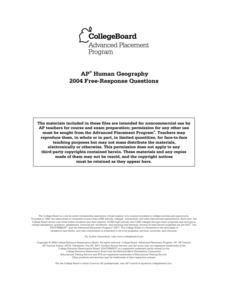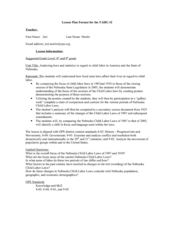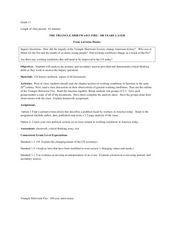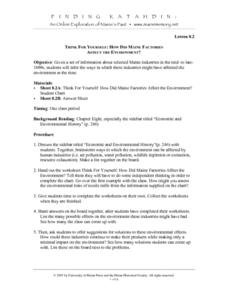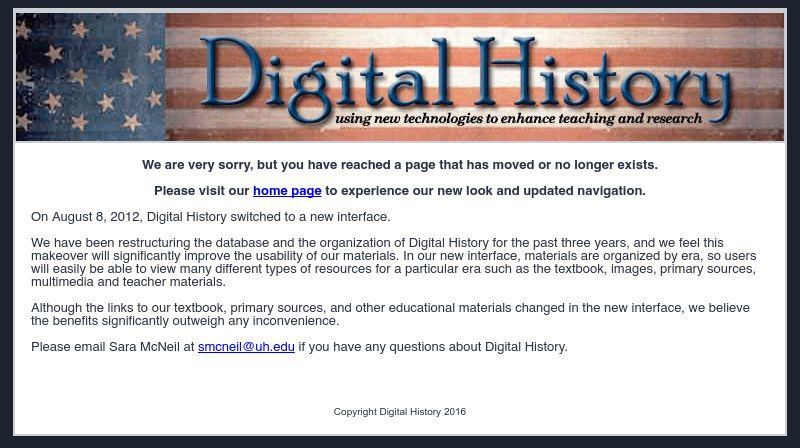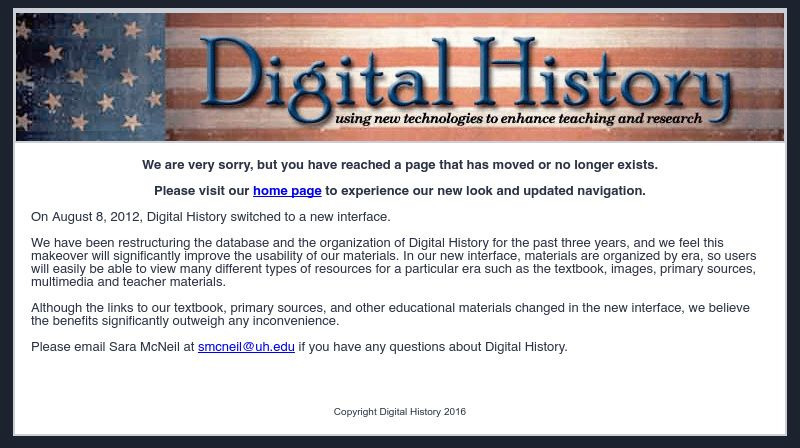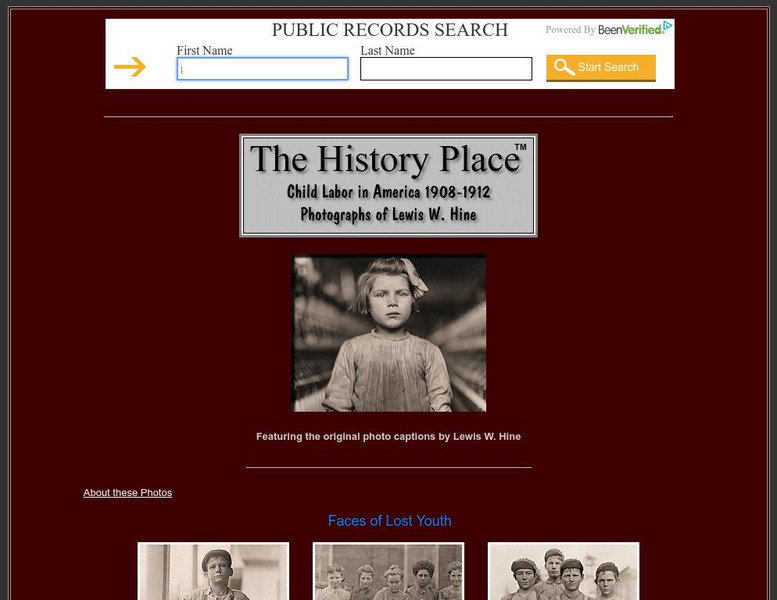Center for History Education
The Triangle Shirtwaist Factory Fire: Is Anyone to be Punished for This?
The stories of bodies falling to the pavement and girls dying in their seats echo to the present day. The New York City Triangle Shirtwaist Factory fire—which killed 147 people, mostly young women and girls—galvanized the labor movement...
DocsTeach
Lewis Hine Shedding Light on Child Labor through Photographs
The Industrial Revolution: long hours, low pay, and unsafe conditions. An eye-opening activity explores the darker side of industry and exposes the realities of child labor with photos. Scholars view four photos from the famous...
National WWII Museum
What It Takes to Win: Mapping Primary Source Evidence
World War II was not just waged in Europe and Asia; the home front was key to Allied victory. Using newspaper clippings from World War II and a map, scholars plot out wartime production in the United States. After that, class members...
College Board
2004 AP® Human Geography Free-Response Questions
Human geography involves everything from why people build factories along the United States-Mexico border to how land-use patterns and demographics are related. So, how do test-takers put it all together? Focused questions from an AP...
Curated OER
Industrial Revolution Unit
Eighth graders create their own newspaper and write articles about things related to the Industrial Revolution. They include five different inventions from the time period and explain how they either benefited or harmed society. They...
Curated OER
Things in Groups Puzzles
For this grouping puzzles worksheet, 7th graders solve and complete 8 different problems that include grouping in various puzzles. First, they read the clues given in each box to solve the puzzle. Then, students create their own puzzle...
Curated OER
Industrialization In Lowell, Massachusetts
Young scholars explore the idealistic expectations of the industrialists who financed and built mills in Lowell, Massachusetts. They research how the expectations of Lowell mill founders compared to the reality of life in the textile...
Curated OER
2nd Grade Social Studies
Having a basic understanding to how our economy works is a great way to help students understand the world around them. This Social Studies presentation focuses on defining the concepts of trade, goods, service, wants, needs, and...
Curated OER
Child Labor
Students examine how how groups and institutions work to meet individual needs and promote the common good, and identify examples of where they fail to do so. They describe how workers with specialized jobs and the ways in which they...
Curated OER
The Triangle Shirtwaist Fire: 100 Years Later
Eleventh graders examine the impact of the Triangle Shirtwaist Fire. In this American History lesson, 11th graders analyze various sources. Students create a cartoon representing the impact of this fire on the United States today.
Curated OER
Quilting Bee-Assembly Line Style
Students identify the roles of a producer and a consumer. In this economics lesson plan, students define the roles of a consumer and producer and produce a quilt using an assembly line.
Curated OER
Thermal Pollution
For this pollution worksheet, students read about thermal pollution and how hot water affects wildlife. Then students complete 1 short answer question.
Curated OER
The Environment and Pollution
In this pollution and the environment worksheet, students complete matching and fill-in-the-blank questions associated with pollution. Some though-provoking conversation starters are embedded in the plan to help the students discuss the...
Curated OER
Industrialization Word Search
In this social studies worksheet, students identify and locate vocabulary terms related to the Industrial Revolution and industrialization. There are 36 words located in the puzzle.
Curated OER
How Did Maine Factories Affect The Environment
Students investigate the history of interactions with the environment in the 1800s. They conduct research looking for possible negative influences upon the environment. The information is used to conduct a class discussion about the...
Curated OER
History Matters: Laissez Faire for Depression Woes
Read this transcript of the testimony of Yale Professer William Graham Sumner speaking before a committee of the House of Representatives in 1878. His contention was that even with the thread of depression, it was in business' best...
PBS
Wnet: Thirteen: Freedom: A History of Us: Wake Up, America!
This resource covers the changing of America due to the Industrial Revolution which brought in not only new technology but also opened the door to reform movements. From the series by Joy Hakim, "A History of Us." Includes a teacher's...
Digital History
Digital History: Roots of American Economic Growth: Transformation of the Rural
Read about the changes in the American economy between 1820 and 1860 that resulted in a market economy encouraged by technological advances in manufacturing.
Digital History
Digital History: The Disruption of the Artisan System of Labor
A look at how goods were produced in the early 1800s in home-based businesses, only to be supplanted by factories with unskilled workers by mid-century.
Digital History
Digital History: The Introduction of the Factory System
The factory system revolutionized manufacturing and the employment of unskilled workers to man the factories. Read about the young children, women, and, later, immigrants who provided the labor to the textile mills and other...
The History Place
The History Place: Child Labor in America: 1908 1912: Investigative Photos of Lewis Hine
Powerfully visual website with haunting images of working conditions faced by child workers in a variety of occupational sites, including mines, textile mills, newspaper stands, and factories. Will make many of today's children empathize...
Other
Wake Forest University: The Industrial Revolution
Two primary source readings on the effects of the Industrial Revolution on families in England and Germany plus some good background information on the Industrial Revolution itself.
CommonLit
Common Lit: Text Sets: The Gilded Age
This is a collection of 8 Grade-Leveled texts (5-12) on the topic "The Gilded Age." Mark Twain named 1870-1900 "The Gilded Age" in hopes of capturing how the era of serious social problems was veiled by a thin layer of gold. While robber...
CommonLit
Common Lit: Text Sets: Workers' Rights
As America grew, so did its production of agriculture and manufacturing, leading to a rise in workers and their demands. Study the history of worker's rights in America from the Industrial Revolution to today. This collection includes 13...





